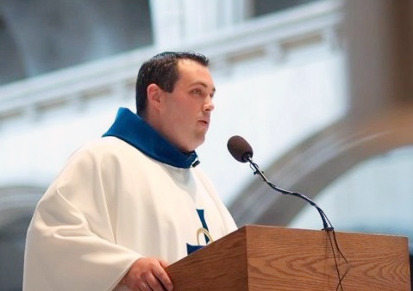By SUZANNE KOZIATEK
Contributing writer
There’s no one way and no perfect time to discern a vocation.
Some people realize as children that they want to become priests or sisters. Others hear their calling in high school or college. Still others come to it later in adulthood, after another career.
Wherever those discerning people are, Father Nicholas Junker wants to meet them there – whether it’s taking boys on tours of seminaries, or speaking at teen retreats or providing awareness of options available to older Catholics.
For the past five years, Father Junker has been vocations director for the Diocese of Belleville. He has also assisted at the Newman Center at Southern Illinois University in Carbondale and is currently sacramental minister at Stephen’s in Caseyville and Holy Trinity in Fairview Heights.
He acknowledges that vocation director can be a difficult and challenging ministry, at a time when there is a severe priest shortage both locally and nationally.
“There are a lot of moments when I feel discouraged,” Father Junker says. “But it can also be incredibly uplifting. In an age that can be very secular, I find a lot of young people are at least willing to explore the idea, to strive to grow in holiness.”
There are currently five seminarians working toward the priesthood – as many as four of them may be called to orders this spring as transitional deacons.
But Father Junker says he looks beyond the numbers to the type of people drawn to religious life these days.
“The men I work with on the whole are great young men,” he says. “I say to them, ‘When I was your age, I was nowhere near where you are now.’ That part of the vocation ministry has been very rewarding.”
Father Junker routinely visits parishes and schools across the diocese trying to plant the seeds of interest in vocations. He finds young people are intensely interested in the life he and other priests lead.
One of the greatest challenges he sees in promoting vocations is getting families to be open to the possibility that their children might choose religious life.
“As family sizes get smaller, parents might already have ideas in mind about what they want for their children, instead of asking ‘What does God want for your child?’” he says.
His own family was very supportive of his vocation – in fact, both his grandmothers were praying for it.
“My mom is the youngest of five, my dad, the youngest of seven, so I was one of the youngest grandsons,” Father Junker says. “They prayed for a priest in their family, and I was influenced by the example of their faithfulness and their prayers.”
He says parish priests and lay leaders can play a pivotal role in encouraging young people to consider vocations and in urging parents to support the idea.
Under Father Junker’s leadership, the vocations office is working to establish vocations ministries in individual parishes. Parish ministries can bring in guest speakers, hold a holy hour for vocations and take other concrete steps to make a parish more vocation-minded, he says.
It’s also a much more effective means of identifying young people who are interested in religious life.
“Ultimately, there are 100-plus parishes in this diocese,” Father Junker says. “It’s not possible for me to connect with young people in all of them and know who will make a good priest. But their pastors know – they are the true vocation directors in their own parishes.”
This may be especially true in less densely Catholic parts of southern Illinois. Father Junker says that in these smaller parishes, the church is often at the very center of people’s lives.
“A lot of young people (in small churches) are more connected to their parish, and that provides the impetus for vocations,” he says, noting that the tiny parish of St. Joseph in Stringtown, has produced two diocesan priests.
Another effective tool in promoting vocations is to help Catholic teens connect with the wider church through events such as World Youth Day.
“Send kids out to be with other young Catholics,” Father Junker says. “Have them see the larger church, see other priests.”
Reaching older people who may be drawn to the diaconate or priesthood is a more complex job.
“A lot of it is just awareness, and information,” Father Junker says. “Many of them may be under the impression that it’s too late, that they would not be considered by the diocese.” He notes that while some dioceses have upper age limits, the Diocese of Belleville considers potential seminarians on a case-by-case basis.
It’s been a difficult time for the Catholic Church, as reports of the ongoing sexual abuse crisis have eroded trust in its institutions. Father Junker says he knows that it affects young men’s discernment. It affected his own, after reports of abuse in the Archdiocese of Boston in the early 2000s.
“It ended up attracting me more to the priesthood – because I was needed more,” he says. “I wanted to be part of the solution.”
He says the young men he meets who are interested in vocations have a similar motivation. “They’re aware of the challenges, and aware of the need for good, holy priests.”
Vocations director encourages parish ministries, support from families
If you are interested in pursuing a vocation, or encouraging vocations in your parish, call the vocations office at the Diocese of Belleville at 618-722-5035 or visit the website at diobelle.org/vocations







